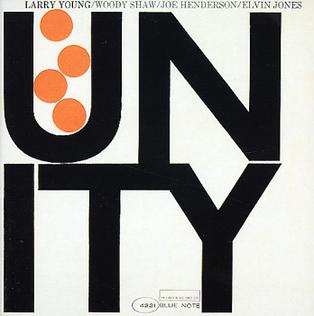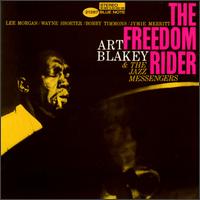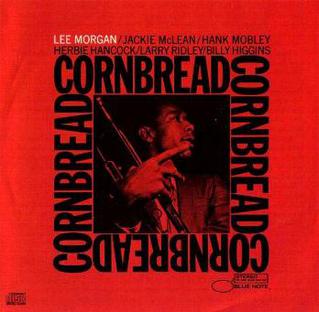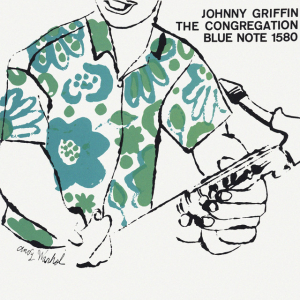
Hard bop is a subgenre of jazz that is an extension of bebop music. Journalists and record companies began using the term in the mid-1950s to describe a new current within jazz that incorporated influences from rhythm and blues, gospel music, and blues, especially in saxophone and piano playing.

Song for My Father is a 1965 album by the Horace Silver Quintet, released on the Blue Note label in 1965. The album was inspired by a trip that Silver had made to Brazil. The cover artwork features a photograph of Silver's father, John Tavares Silver, to whom the title composition was dedicated. "My mother was of Irish and Negro descent, my father of Portuguese origin," Silver recalls in the liner notes: "He was born on the island of Maio, one of the Cape Verde Islands."

Unity is an album by jazz organist Larry Young, released on the Blue Note label in August, 1966. The album features trumpeter Woody Shaw, tenor saxophonist Joe Henderson and drummer Elvin Jones. While not free jazz, the album features experimentation that was innovative for the time. Young chose the title because, "although everybody on the date was very much an individualist, they were all in the same frame of mood. It was evident from the start that everything was fitting together." The album was Young's second for Blue Note, and is widely considered a "post-bop" classic.

Miles Davis, Volumes 1 & 2 are a pair of separate but related albums by American jazz trumpeter Miles Davis recorded on May 9, 1952, April 20, 1953 and March 6, 1954 and released on Blue Note early 1956. The three sessions were originally released on ten-inch LPs as Young Man with a Horn (1953), Miles Davis, Vol. 2 (1953) and Miles Davis, Vol. 3 (1954), respectively.

A Night at the "Village Vanguard" is a live album by American jazz saxophonist Sonny Rollins recorded at the Village Vanguard in New York City on November 3, 1957 and released on Blue Note the following year. Rollins played three sets, one in the afternoon and two in the evening, with different rhythm sections: Donald Bailey and Pete LaRoca, and Wilbur Ware and Elvin Jones, respectively.

Art Blakey and the Jazz Messengers, also called Moanin', is a studio album by Art Blakey and the Jazz Messengers recorded on October 30, 1958 and released on Blue Note later that year.

The Freedom Rider is an album by jazz drummer Art Blakey and his group the Jazz Messengers, recorded in 1961 and released in 1964 by Blue Note Records. Continuing Blakey's distinct brand of hard bop, this album features compositions from Wayne Shorter, Lee Morgan, Blakey himself, and Kenny Dorham, a former Jazz Messenger. This was the final album by this particular edition of the Jazz Messengers, who had been together for 18 months, as Lee Morgan left after this album and was replaced by Freddie Hubbard.

Tom Cat is an album by Lee Morgan recorded in 1964, though only issued in 1980. It was originally released as LT 1058. While lesser known in comparison to The Sidewinder and other albums, it features several of Morgan's contemporary Blue Note recording artists, such as McCoy Tyner, Art Blakey, and Jackie McLean. After The Sidewinder's huge commercial success, Tom Cat and Search for the New Land from earlier in 1964 were both shelved. Instead, Alfred Lion, Blue Note's producer, encouraged Morgan to record a new funky theme and brought him back into the studio to record The Rumproller. Search for the New Land was released in 1966, but Tom Cat remained unreleased until 1980.

A Night at Birdland, Vols. 1 & 2 are a pair of separate but related live albums by the Art Blakey Quintet, recorded at the Birdland jazz club on February 21, 1954 and released on Blue Note in 1956. The performance was originally spread out over three 10" LPs as A Night at Birdland Vols. 1–3 (1954).

Cornbread is an album by American jazz trumpeter Lee Morgan. Recorded in September 1965 but released on the Blue Note label in early 1967, the album features performances by Morgan, along with sidemen Herbie Hancock, Billy Higgins, Jackie McLean, Hank Mobley, and Larry Ridley.

Search for the New Land is an album by jazz trumpeter Lee Morgan. A set with a group of regular Blue Note sidemen, Search for the New Land was recorded before The Sidewinder was released. Although it was recorded in 1964, the album was shelved for two years, then issued with the original catalogue number 84169.

Page One is the debut album by American jazz tenor saxophonist Joe Henderson, recorded and released by Blue Note Records in 1963. Henderson is featured in a group with trumpeter Kenny Dorham, pianist McCoy Tyner, bassist Butch Warren and drummer Pete La Roca. The pieces on the album were written by either Henderson or Dorham, and include two pieces that went on to become jazz standards: Henderson’s "Recorda Me" and Dorham’s "Blue Bossa". All of the musicians are listed on the album's front cover with the exception of Tyner, who is credited as "ETC." due to his being signed to rival Impulse! Records.

Live at the Lighthouse is a live album by jazz trumpeter Lee Morgan, released on the Blue Note label in 1971. The album features a quintet of Morgan, Bennie Maupin, Harold Mabern, Jymie Merritt, and Mickey Roker, recorded at The Lighthouse in Hermosa Beach, California in July 1970. Originally released as a double LP comprising four side-long recordings, the 1996 CD reissue expanded the track list with over one-hundred minutes of additional material from the Lighthouse gigs. In 2021, Blue Note released an 8-CD/12-LP box set featuring the complete recordings of Morgan's three-night stint to commemorate the original album's fiftieth anniversary.

The Rajah is an album by jazz trumpeter Lee Morgan released on the Blue Note label. It was recorded on November 29, 1966 but not released until 1985, and features performances by Morgan, Hank Mobley, Cedar Walton, Paul Chambers and Billy Higgins. The recording was found in the Blue Note vaults by Michael Cuscuna in 1984.

Charisma is an album by jazz trumpeter Lee Morgan featuring performances by Morgan, Jackie McLean, Hank Mobley, Cedar Walton, Paul Chambers and Billy Higgins. Recorded on September 29, 1966, but not released until 1969, on the Blue Note label.

Infinity is an album by jazz trumpeter Lee Morgan, released on the Blue Note label. It was recorded on November 16, 1965 but not released until 1981 and features performances by Morgan with a quintet featuring Jackie McLean, Larry Willis, Reggie Workman and Billy Higgins. The album was reissued on CD in 1998 as a limited edition.

Leeway is an album by American jazz trumpeter Lee Morgan recorded on April 28, 1960 and released on Blue Note the following year. Morgan's quintet features saxophonist Jackie McLean and rhythm section Bobby Timmons, Paul Chambers and Art Blakey.

Back to the Tracks is a hard bop album by tenor saxophonist Tina Brooks recorded in 1960 and released posthumously. The album was originally intended as BLP 4052, but, for some reason, it was shelved at the time. A song recorded during the session, "David the King", was rejected since it "never made it to releasable quality". The composition was later re-recorded for Brooks' final Blue Note session, eventually released as The Waiting Game. The tracks first appeared in a Mosaic 12" LP box-set (MR4-106) entitled The Complete Blue Note Recordings of The Tina Brooks Quintets. A Blue Note CD appeared in 1998, then reissued in 2006.

Minor Move is an album by American hard bop tenor Tina Brooks. It features performances by Brooks, Lee Morgan, Sonny Clark, Doug Watkins and Art Blakey. It was recorded on March 16, 1958, and was the first album Brooks recorded as a leader for the Blue Note label. The album, however, remained unreleased until being issued in Japan in 1980. In 2000, Minor Move was released on CD. The composition "Nutville" is sometimes credited to Lee Morgan, but as producer Michael Cuscuna explains in the liner notes to the 2000 release: "Lee brought the tune to the session, but never claimed credit for it. Curtis Fuller also confirms that it was indeed a Tina Brooks original."

The Congregation is an album by American tenor saxophonist Johnny Griffin recorded on October 23, 1957 and released on Blue Note the following year—his final recording for the label.




















